- Home
- Alex Scarrow
No Escape Page 9
No Escape Read online
Page 9
“It does the job, young lad,” replied the old man. “Twenty feet of choppy seawater does the job real nice and keeps them pesky little buggers away. As for Sheila”—he patted his gun—“she keeps any troublemakers at bay.”
“Your sign said that we’d be welcome,” said Leon. “Is that the case?”
“Aye. So long as you’re all well behaved and infection free.”
He nodded, then glanced behind him. Howard was passing Kim a fire extinguisher from the rear of the truck. Keep it cool. They got our backs.
“We’re good,” he replied. “No virals. Can we cross over, please?”
The old man pinched a bulbous, red nose, then scratched at his thick, white beard. “No infection. Well, that’s good.”
“So?” prompted Jake. “Can we come over?”
The old man raised a finger to hush him. “Two shakes of a lamb’s tail, young man.” He picked something up off the plastic garden table. Leon saw it was a radio handset.
“Peter calling home guard. Over.”
The handset crackled an answer that Leon couldn’t quite hear.
“We got us some visitors down on the bridge.”
Another crackled reply. Then the old man cocked his head and squinted at them all intently for a few moments. “We got seven of ’em. Two snotty kids. Two scruffy young boys, a big man, an older woman, and a scrawny-looking fella.”
“Nice. I think he managed to offend us all in one sentence,” whispered Jake.
Leon ignored him. “I wish he’d hurry the hell up. We’re sitting ducks out here.”
The radio crackled again after a moment.
“Guv’nor wants to know if you got any guns with you besides that one?”
“Yes, we’ve got a few,” replied Leon. “They’re in the truck.”
“They say they got some guns,” said the old man. He waited for a reply.
“Please! Can we hurry this up?” called out Cora. She looked back down the road at Kim and Howard on guard. “We’re all feeling quite vulnerable standing out here.”
Leon looked back. Beyond the truck was the small fishing town they’d driven through. Narrow cobbled streets between buildings that looked weather blasted and old. Nature, just as it was everywhere else, was doing a splendid job here reclaiming the world left behind. Tall clumps of stinging nettles had sprouted effortlessly from front lawns, window boxes, recycling cans, and even—Leon had spotted—from the seat of an abandoned baby carriage. The buildings, with their dark interiors, were close enough for them to feel uncomfortable hanging around here any longer than they needed to.
The radio finally crackled again.
“He says you lot can come over,” said the old man. “But you gotta hand yer guns in.”
“OK, fine,” replied Jake.
“And I gotta hose ya down first!”
“Oh, come on!” hissed Leon.
Come on. Come on. Come on.
The old man carefully set the shotgun down on the table. “You lot know about the virus and salt?”
“Yeah,” replied Leon.
The old man bent down painfully slowly and reached for a length of hose at his feet, turned a tap on outside the cabin, then picked up the hose. He sprayed his arm with water. “There, just so you can see I’m not a gremlin!” He aimed it their way. “Right, stand still, you lot!” He aimed high, producing an arc of spattering water that crossed the gap in the bridge. Leon was at the front. He closed his eyes as freezing-cold salt water spattered across his face.
“Good! You seem human!” shouted the old man. “Right…you, scruffy lad, you’re next!”
Jake let out a yelp as the water soaked him. “Bloody hell, it’s freezin’, mate!”
“What do you want, warm water and bubble bath? Next!” A couple of minutes later, everyone was dripping wet and shivering as the old man slowly turned the tap off and dropped the hose at his feet. “Congratulations, you’ve all passed our immigration test!”
He bent over and scooped up a length of rope and tossed it across the gap to Leon.
Leon caught it. “What’s this do?”
“Have a tug on it and you’ll see, lad.”
Leon took up the slack and saw the other end of the rope was attached to a wooden beam.
“The pirate’s gangplank,” the old man wheezed merrily.
Leon tugged on the rope and the plank slithered and scraped across the cracked asphalt on the far side. Jake and Adewale stepped forward, and between the three of them, they quickly pulled it across the six-yard gap.
Leon put a foot on the wobbling plank and shuffled his way across.
“Ah-aaahhh!” croaked the old man loudly. “Welcome aboard HMS Portland, me hearties!”
The sea sloshed below him in lazy waves that flowed over and around a mound of collapsed bricks and mortar and drew back with a tired hiss. Leon was looking down at a three-yard drop on either side of the plank—not exactly deadly, but he’d break a bone or two on that rubble if he did fall. He took a dozen more cautious steps across the shaking plank of wood until finally he was over on the far side.
“Next!” barked the old man.
“Come on,” urged Leon. “Kim! Howard!” he called out. They turned to look his way. Leon beckoned for them to head to the bridge.
“What about our truck?” asked Jake.
He looked at it. “Well, it’s a very nice truck, young man.”
“No, I mean how do we get that over?”
“You don’t. It stays where it is. For now.” He winked. “No one’s going to steal it, are they?”
Finally, they were all across, and Leon suddenly felt an invisible weight lift from his shoulders. They were safe for the moment, protected by a barrier the virus had no possible chance of crossing.
He remembered feeling this way at the castle when Freya and he had been welcomed by Mr. Everett, and again in Southampton, when they’d run into those soldiers in biohazard suits—an overwhelming sense of exhaustion and relief. For the last few days, they’d all been measuring the rest of their lives in hours. And since Leon had stepped hesitantly into the role of group leader, he’d had no option but to act confidently, certain of their survival.
It was an exhausting act, and at last, he could drop it. Someone else was going to be in charge and making the decisions for them from now on.
The old man gestured with a thumb over his shoulder. “Now then, there’s a taxi waiting for you lot.”
Leon looked around him. “Where?”
The old man rolled his eyes. “I’m joking. It’s only a short walk, you lazy slacker!”
From the right, the long spit of beach closed in on the road, and to the left, the grass narrowed until it was a mere green ribbon beside the asphalt, creating a narrow bottleneck of land. Beyond that, Leon could see the low hump of the Isle of Portland, but in front, running across the narrow road, he could see a barricade.
“That’s our second and final line of defense,” explained the old man.
It was a thrown-together blockade made, by the look of it, from wooden planks salvaged from countless boats and dinghies. The barricade was about two yards high and looked unlikely to stop anything determined to scramble over it, certainly not the virus.
A head appeared over the wall, with white, tufted hair and wide, just-awoken, blinking eyes.
Another oldie. Leon was beginning to wonder whether they’d strayed onto some island-sized nursing home.
“Dereck!” the bearded old man called up.
“Ah, Peter. I see you have some guests! Are they clean?”
“Aye.”
The barricade gate wobbled inelegantly as it swung open. “Sleeping on the job again?” muttered Peter as they passed through and the gate began to close behind them. “That lazy old bugger was immigration control”—he raised his voice for everyone t
o hear—“and this…is the Kingdom of Portland!”
Part II
Chapter 17
On the western side of Russia, near the borders of the Ukraine and Belarus, lies a city called Voronezh, named after the sedate-moving Voronezh River, which runs north-south through it, the city spreading on either side. In the southern district of Levoberezhny is a vast plant that runs alongside Dimitrova Street, a road that takes you either west into the beating industrial heart of the city, or east out into the endless, horizon-less, breadbasket fields of central Russia.
The production plant was half-French, half-Russian owned and, until two years ago, had been the largest producer of yeast in Russia, the second largest in the world, churning out twenty thousand tons of dried yeast powder every year.
In the immediate aftermath of the outbreak, this enormous complex of fermentation chambers, separation tanks, and cane- and beet-storage silos lay abandoned and silent, the cavernous and cadaverous remains of an industrial digestive system.
It took the virus eighteen months to find it.
The first winter, the virus was consolidating across every city, town, and village in the world. It migrated its mass down into subterranean hideaways, underground rail networks, and sewage systems, away from the light and the cold. Each hideaway was linked by threads to the greater viral metropolis. Consolidation took the form of the thickening of these linking tendrils, tightening the internal infrastructure, and reaching out to make contact with other masses of the virus.
It was one of these roots, growing eastward out of the city of Voronezh to seek new friends and allies, that came across the yeast production plant. One root that, on a cool February morning, had stopped tunneling belowground and had surfaced briefly. Emerging into the daylight, it began to grow a swollen knuckle of resinous material. The knuckle quickly grew into a distended glistening blister, which eventually burst after a couple of hours, spilling out a dozen scuttling creatures on to the melting snow. That was routine behavior for an exploratory growth: tunnel for a while, then surface and explore. If nothing of interest was found, it would tunnel back down and continue on.
One of the tiny mobile scouts—no bigger than a pebble, released from the root that morning—randomly scuttled through the open door of a storage silo and made a significant discovery.
Yeast. Sugar beets.
The Voronezh biomass concentration swiftly set about relocating to the industrial side of the river, growing rapidly across the four traffic lanes of the Vogresovskiy Bridge, pumping itself eagerly through thickening arteries toward the abandoned production plant and the super-reservoir of sugar riches located in the silos there.
As an already-tepid second summer cooled with approaching autumn, news spread of the find. Viral concentrations located farther east in urban ruins with place names like Moscow, Beijing, and Mumbai extended and thickened their links and dispatched emissaries and queries. A trans-Asian “trunk,” with a diameter as thick as a car and protected by a thick, leathery epidermis, snaked its way thousands of miles through mountains and deserts, through dense forests and marshland—a construction every bit as ambitious as the Great Wall of China.
The contiguous land mass of Eurasia now had its viral equivalent of a capital city. As once all roads led to Rome, so all threads now led to Voronezh.
Next to one of the silos was a tall cylindrical fermenting tank surrounded by a framework of metal support struts. The vast tank was now buried beneath protective layers of resinlike material that gave it the appearance of a termite mound on an impossible sixty-yard-high scale. A termite mound linked by thousands of viral transit cables, the thickest of them snaking across the ground toward it like tree roots, others slimmer, branching across from nearby buildings, equally coated in resin, like the tentative early support threads of a spider’s web.
The ugly, unordered, lumpy coating of resin made it look like the artless work of dull-witted termites and belied the complexity of what lay within: a raging cauldron of broth, a liquid universe.
Camille had been the very first.
Her encounter with the virus on an arid no-man’s land in West Africa, a tundra of dust and dry grass peppered with rusting land mines, had occurred a few days before the virus had become news. In the human family tree of infection, she was Eve: in the words of virologists, Patient Zero.
Camille had become one of the first representatives, one of the first human advocates.
What They had told her, what They wanted to be very clear about, was this: They were only here to help. To facilitate—that was all.
The big decisions about what happened next had to be ours. Humanity’s.
Facilitators. Not murderers. Nor malignant conquerors.
Helpers, that was all They were.
They were here bearing a wonderful gift.
Of all the human arrivals to this micro-universe, Camille had had the most time to try to understand Them. At the most basic level, existence was an endless ocean of single-cell life. Everybody, every living thing, was made up of Them and what had once been Us. But whenever cells paused from their endless mingling and began to casually link into daisy chain, they very quickly became complex weblike gatherings. So the cells’ “ancestry” began to emerge, an evolutionary life story told in fast-forward. The greater the gathering, the more the story revealed itself.
Camille was vaguely aware of this gathering process as millions of cells, recognizing each other like delegates at a conference, exchanged chemical handshakes and then bonded together. It was like waking from a sleep, the gradual assembly of her consciousness, of her sense of I.
In her simplest form, she had traveled many of the main arterial routes of this brand-new viral empire. She had awoken to see the gleaming spires of Shanghai draped in vast, fluttering skin sheets, gathering and converting sunlight into sugar, to see forests of methane-filled sacks tethered to and floating above the minarets of Medina. She’d woken to see the fresh water of Lake Geneva covered in a purple lid thick enough to walk on, to see the London Eye turned into a pastel-pink parasol, glowing a rosy hue as sunlight shone through the skin membrane that had grown between its spokes. The virus’s ingenuity never ceased to astound her. Ingenuity borne from an infinite crowd intelligence, in the way a school of mackerel can perform the most graceful, constantly evolving, living sculptures from a simple base set of flocking rules.
Camille had seen this new world from outside and from within and couldn’t help but admire what it had achieved: the total conquest and subjugation of a complete world within months. And all of that done with a benign intent, a genuine wish to be kind.
Now, her foggy version of self-awareness was sharpening and becoming clearer as her recent memories sorted themselves into order. She didn’t know the name of the city; the lettering on the signs was unusual, indecipherable, even for a girl who knew French, Hausa, and English. It looked like some kind of production plant in an industrial smoke-belt city, but in viral terms, it was ground zero, their gathering of command clusters. Their Vatican City.
Their epicenter.
Chapter 18
They had informed Camille that it was time for a gathering. The process of consolidation demanded it now. A unifying of purpose, a synchronization of efforts, as the virus prepared to embark on the third and final stage of its ambitious program. But before that happened, some matters needed to be resolved.
Camille let her mind assemble the illusion. She had seen pictures in her battered, old school textbooks of American government buildings and chose a visualization that seemed to suit the vast liquid gathering of biomass. She imagined a courtroom on a grand scale, converting the boiling cauldron of cellular life into rising tiers of pale marble benches arranged in a semicircle around a stage and populated with an audience.
Humanity.
The tiers receded into the distance until they vanished into a haze. The faces nearest to her were defin
ed by what she sensed of them—amino acid signals that suggested a gender, an ethnicity, an age.
She visualized the representative for “Them” as a judge in a long, powdered wig and flowing robes, a majestic figure with deep-set eyes and a Roman nose, sitting on top of a podium on a marble throne, and she presented herself as the little girl from an African village that she’d once been.
Even down to her faded flower-print dress and her pink gel flip-flops.
Camille was here as an “advocate witness,” one of 169 chosen witnesses. They were all here to share their knowledge, and the judge was here just to listen and arbitrate.
Deep within the thick broth inside silo three, a chemical spread out like ink dropped into a washbasin of clear water, diluting as it went, eventually staining the water a faint and uniform pale blue. Camille’s mind translated that into a “shhh” being passed back through the gathered crowd, tier by tier and up into the distance.
Now that the low murmuring of voices had been silenced, the judge leaned forward on his throne and spoke with a soft but commanding voice. “You understand why you and the other advocate witnesses have been called together? To decide the fate of those who remain.”
They nodded.
“Let us begin.” He turned to look toward Camille and the other witnesses around him. She could taste their nervousness and imagined they could taste hers. “The first may introduce itself.”
She felt attention turn her way, sensed faint chemical feelers daisy-chaining around her.
“My name was Camille Ramiu. I was one of the first…I think?” She looked up at the judge for confirmation.
He nodded. “Yes, you were.”
She turned to face the endless audience. “I was an orphan in a warring country. My mother died of sickness; my father was killed by militia. I became my sister and my brother’s guardian. I saw a dog was dying—it licked me. And now I know that that was when I was saved.” She turned to look over her shoulder, up at the judge. “I want to thank you.”
She saw him nod and the slightest smile touch his solemn face. How much of that was chemically signaled and how much was the embellishment of her imagination was unclear.

 Day of the Predator
Day of the Predator Ellie Quin Book 3: Beneath the Neon Sky
Ellie Quin Book 3: Beneath the Neon Sky The Mayan Prophecy
The Mayan Prophecy October Skies
October Skies Ellie Quin Episode 4: Ellie Quin in WonderLand (The Ellie Quin Series)
Ellie Quin Episode 4: Ellie Quin in WonderLand (The Ellie Quin Series) Time Riders
Time Riders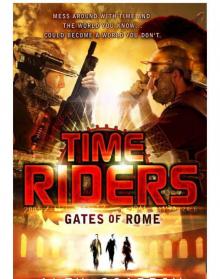 Gates of Rome
Gates of Rome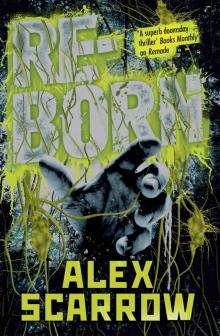 Reborn
Reborn City of Shadows
City of Shadows Ellie Quin Book 2: The World According to Ellie Quin (The Ellie Quin Series)
Ellie Quin Book 2: The World According to Ellie Quin (The Ellie Quin Series) Ellie Quin Episode 5: A Girl Reborn
Ellie Quin Episode 5: A Girl Reborn Spore
Spore The Eternal War
The Eternal War Last Light
Last Light Remade
Remade Ellie Quin Book 2: The World According to Ellie Quin
Ellie Quin Book 2: The World According to Ellie Quin Ellie Quin Book 3: Beneath the Neon Sky (The Ellie Quin Series)
Ellie Quin Book 3: Beneath the Neon Sky (The Ellie Quin Series)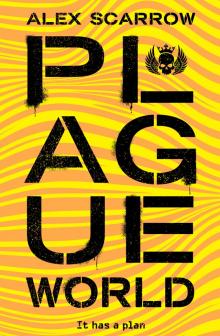 Plague World
Plague World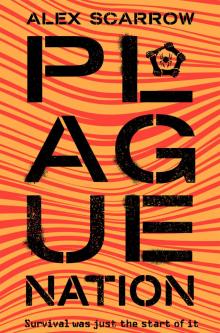 Plague Nation
Plague Nation Ellie Quin Book 01: The Legend of Ellie Quin
Ellie Quin Book 01: The Legend of Ellie Quin Ellie Quin - 04 - Ellie Quin in WonderLand
Ellie Quin - 04 - Ellie Quin in WonderLand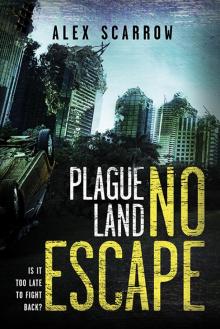 No Escape
No Escape TimeRiders
TimeRiders A Thousand Suns
A Thousand Suns The Candle Man
The Candle Man The Pirate Kings
The Pirate Kings Burning Truth: An Edge-0f-The-Seat British Crime Thriller (DCI BOYD CRIME THRILLERS Book3) (DCI BOYD CRIME SERIES)
Burning Truth: An Edge-0f-The-Seat British Crime Thriller (DCI BOYD CRIME THRILLERS Book3) (DCI BOYD CRIME SERIES) Day of the Predator tr-2
Day of the Predator tr-2 City of Shadows tr-6
City of Shadows tr-6 TimeRiders: The Infinity Cage (book 9)
TimeRiders: The Infinity Cage (book 9) The mayan prophecy (Timeriders # 8)
The mayan prophecy (Timeriders # 8) TimeRiders: The Doomsday Code (Book 3)
TimeRiders: The Doomsday Code (Book 3)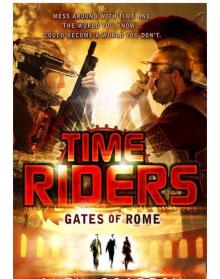 Gates of Rome tr-5
Gates of Rome tr-5 TimeRiders: The Pirate Kings (Book 7)
TimeRiders: The Pirate Kings (Book 7) TimeRiders: The Mayan Prophecy (Book 8)
TimeRiders: The Mayan Prophecy (Book 8)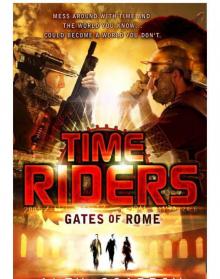 TimeRiders 05 - Gates of Rome
TimeRiders 05 - Gates of Rome The Doomsday Code tr-3
The Doomsday Code tr-3 The Eternal War tr-4
The Eternal War tr-4 TimeRiders: City of Shadows (Book 6)
TimeRiders: City of Shadows (Book 6) Time Riders tr-1
Time Riders tr-1 Afterlight
Afterlight TimeRiders, Day of the Predator
TimeRiders, Day of the Predator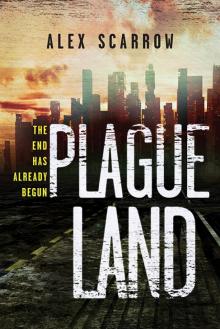 Plague Land Series, Book 1
Plague Land Series, Book 1